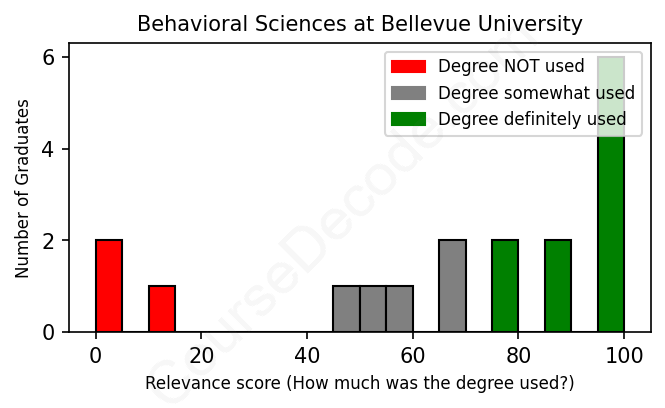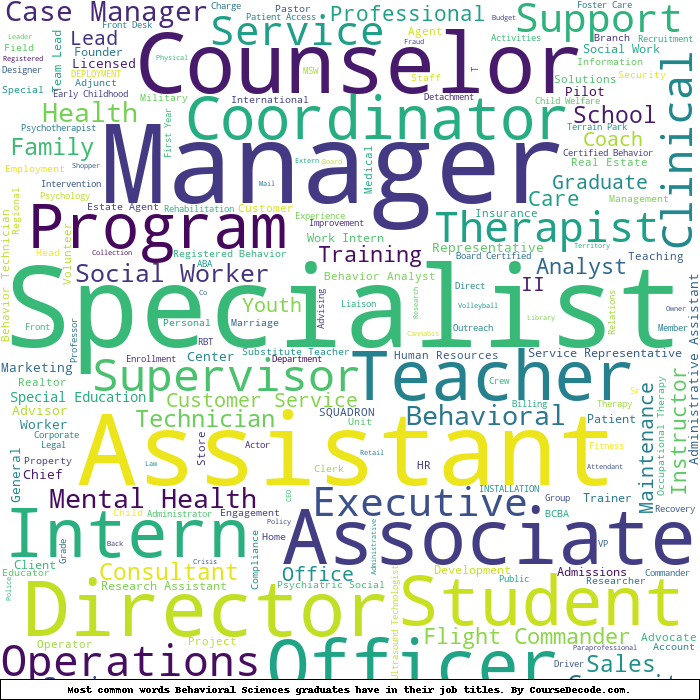
First, some facts. Of the Behavioral Sciences graduates from Bellevue University we've analyzed , here's how many have used (or NOT used) their degree in their career:

These are estimates based on AI analysis of 18 LinkedIn profiles (see below).
The verdict? Slightly above average. Overall, with an average relevance score of 68%, Behavioral Sciences graduates from Bellevue University have a slightly higher likelihood (+1%) of finding work in this field compared to the average graduate across all fields:
And for comparison, here's the chart for all profiles we've looked at across all degrees.
Also, after graduating, 44% of these graduates have pursued further education other than another Bachelor's degree (such as a Masters degree or other), compared to the average across all profiles of 35%. This suggests you may need more than just a Bachelors degree to be competitive as a Behavioral Sciences graduate.
See the details:
|
Relevance score: 100% We think this person has gone into a career highly relevant to their degree. We think this person has gone into a career highly relevant to their degree.
DEGREE INFOGraduated in 2013 from Bellevue University with a Bachelor of Science - BS in Behavioral Sciences. No other secondary education since. JOB HISTORY SINCE GRADUATIONFoster Care Licensing Specialist Christian Heritage Aug 2022 - Jun 2023 ABOUTI am a passionate and dedicated woman with a Cosmetology Certification and Bachelor of Science degree in Behavioral Science. I am from Omaha, Nebraska. I have a strong desire to care for others, ensuring they function at their best. With my academic background and innate compassion, I have honed my skills in understanding human behavior and psychology, which enables me to connect with people from all walks of life.I am a caring individual who believes that everyone deserves the best, and I always go above and beyond to ensure my clients' needs are met. My ability to listen actively and provide empathetic support has made me an asset to any team that I have worked with. With my positive attitude and infectious enthusiasm, I am always ready to take on new challenges and learn from my experiences.In summary, I am an exceptional candidate for any role that requires a caring and dedicated individual with a passion for helping others. My academic qualifications and experience make me an ideal candidate for any role related to care, support, and leadership. I would be an asset to any team. |
The top 10 most common jobs done by the graduates we've analyzed (ranked most common to least) are:
When looking at the career paths of graduates from Bellevue University with a degree in Behavioral Sciences, it’s clear that a significant portion of them have gravitated towards roles in education and social services. Positions like Early Intervention Specialists, Special Education Teachers, and Crisis Intervention Counselors pop up frequently, showcasing a strong alignment with their studies. These roles often require an understanding of human behavior, strategies for helping others, and skills in managing developmental and psychological challenges, which all tie back directly to what they learned in their Behavioral Sciences programs.
However, not every job these graduates have taken on is closely related to their degree. Many have found themselves in positions that, while they might utilize some soft skills from their training—like communication and problem-solving—don’t primarily focus on behavioral science principles. For instance, roles like office assistants or customer service representatives seem to lack the core behavioral science applications. Overall, while many graduates are making a clear impact in fields aligned with their education, others have ventured into less relevant jobs, which dilutes the overall relevance of their degree in some cases. It’s a mixed bag, but there's definitely a strong trend towards utilizing their education in meaningful ways within educational and social services sectors.
Here is a visual representation of the most common words in job titles for Behavioral Sciences graduates (this is across all Behavioral Sciences graduates we've analyzed, not just those who went to Bellevue University):

When you look at the career paths of graduates from Bellevue University who studied Behavioral Sciences, it seems like a mix of success and some more winding routes. Right after graduation, many start off in roles closely related to their field, such as Early Intervention Specialists, Social Services Analysts, or teachers in special education. These jobs reflect a commitment to helping others and utilizing their knowledge in a practical way. It’s pretty encouraging to see that a good number of graduates seem to land jobs that align well with their degree, which usually points to a positive transition from school to the workforce.
However, as we glance at the 5- to 10-year mark, things get a bit more varied. While some have climbed the ladder into management positions like a Director of Recovery Connections or Client Solutions Executive, others have experienced roles that might feel less connected to Behavioral Sciences, like a shift manager or an insurance agent. This variety suggests that while many graduates stick to careers that leverage their degree, there’s a significant chunk that veers into jobs that might not directly align with what they studied. Overall, if you're considering this field, there’s a solid chance of finding work that resonates with your education, but also be prepared for the possibility of taking on varied roles as you figure out your career path.
Getting a Bachelor’s degree in Behavioral Sciences at Bellevue University, or really anywhere, can be a mixed bag in terms of difficulty. It’s not typically the hardest degree out there, but it does require a fair bit of reading and understanding human behavior, which can get pretty deep and complex. You’ll probably encounter a good mix of psychology, sociology, and maybe some research methods, which can be enjoyable if you’re into that kinda stuff. If you’re willing to put in the effort and engage with the material, it can definitely be manageable, but if you’re not into studying human behavior, it might feel a bit tougher. Overall, it’s more about your interest and dedication than it is about the sheer difficulty of the coursework.
Most commonly, in the LinkedIn profiles we've looked at, it takes people 2 years to finish a Bachelor degree in Behavioral Sciences.
Looking at the job paths of these Behavioral Sciences grads from Bellevue University, it seems like they’re earning a mixed bag when it comes to decent money. Many are working in education and social services, which can be rewarding but often come with lower pay compared to other sectors, especially for positions like Early Intervention Specialists or Direct Support Professionals. On the flip side, some, like those who've moved into managerial roles in clinical settings or business development, may be raking in better salaries. For instance, the grad who went from Clinical Liaison to Director of Business Development likely saw a nice jump in earnings. So, while some are probably making ends meet just fine, others might struggle a bit more, making it clear that the financial outlook can vary quite a bit in this field.
Here is a visual representation of the most common words seen in the "about" section of LinkedIn profiles who have a Bachelor degree in Behavioral Sciences (this is across all Behavioral Sciences graduates we've analyzed, not just those who went to Bellevue University). This may or may not be useful:

Here are all colleges offering a Bachelor degree in Behavioral Sciences (ordered by the average relevance score of their Behavioral Sciences graduates, best to worst) where we have analyzed at least 10 of their graduates:
| College | Score | Count |
|---|---|---|
 Wilmington University Wilmington University
|
84 | 20 |
 Mercy College Mercy College
|
73 | 12 |
 Bellevue University Bellevue University
|
68 | 18 |
 Utah Valley University Utah Valley University
|
64 | 18 |